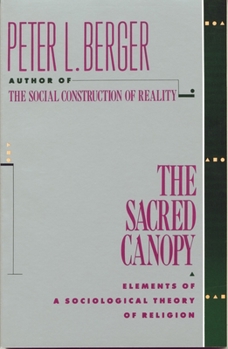The Sacred Canopy: Elements of a Sociological Theory of Religion
Select Format
Select Condition 
Book Overview
An absorbing and original examination that brilliantly argues that religion is a product of the society from which it springs--featuring illustrations drawn from a variety of primitive, ancient, and contemporary religions.
In this book, Berger that religion is the "sacred canopy" which every human society builds over its world to give it meaning, expanding on theories of knowledge that he first explored (with Thomas Luckmann) in The...
Format:Paperback
Language:English
ISBN:0385073054
ISBN13:9780385073059
Release Date:October 1990
Publisher:Anchor Books
Length:240 Pages
Weight:0.46 lbs.
Dimensions:0.6" x 5.1" x 8.0"
Customer Reviews
4 ratings
Seminal Sociological Text
Published by Thriftbooks.com User , 16 years ago
A seminal work in sociological theory. Berger's argument that the process of being religious comes from a deep seated biological need for humans to structure their environments is both empirically demonstrable as it is important for theologians in order to understand the assumptions that govern doctrine. The process is a dialectic from externalizing structures of understanding reality that create order. These are then apprehended as objects by others and internalized. From this internalization new structures will then emerge as the process continues. Epistemologically, this process is then regulated in terms of plausibility and legitimation. As structures of order are created, different ways of knowing and understanding the world are made plausible and thus different forms of knowledge are seen as legitimate ways of understanding and maintaining order in the world. The end of this process is to make the world a habitable place by mitigating the effects of disorder or "anomy". The last piece on secularization traces the division of the numinous reality of God and the spiritual things of God and the physical structures of experience. This begins in the radical division between Yahweh and Israel, is re-united in medieval Catholicism, and then re-divided in Protestantism. Rationalism in the Nineteenth century then creates a challenge where theology is forced to define itself against a more plural environment where the plausibility of religious dogma is challenged by other equally plausible structures of reality. Maintaining these religious plausibility structures is legitimated in terms of marketing their respective value rather than assuming that one's dogma must be true in itself. Berger closes with the state of this process in the late 1960's where theology was in the process of coming out of the neo-orthodox reassertion of the otherness of God and primacy of Scripture and investing itself with psychological and existential legitimation. He uses Tillich as an example of this. It is important for theologians to understand that in the process of doctrinal analysis and synthesis, that theology is relative to social constructions that shape doctrine by virtue of being human. The tendency is to mask theology as some discipline which is beyond the reproach of answering the challenge of what we can observe empirically. This is not the case is theology is a discipline that can develop and progress as do other disciplines in the field of what humans can know and understand about the world and themselves.
One of the basic texts
Published by Thriftbooks.com User , 20 years ago
There are few books that lift the veil surrounding religion--Berger's book is one of them. Religion is not simply a spiritual phenomenon, it is a social one as well. Berger zeros in on this social aspect and allows us to see one of the reasons that every society has, and undoubtedly will continue to have, religion. Berger argues that human beings live in a peculiar world; it is a cultural world, a world of meaning, and religion plays a specific role in creating and maintaining this world. Is the book difficult to read as some commentators have said? Yes. Is it worth the effort? Undoubtedly. After reading this book, the reader will never view their world or religion in quite the same way.
Put it on your must-read list!
Published by Thriftbooks.com User , 24 years ago
"The Sacred Canopy" is an excellent introduction to Peter Berger, as well as a good way to gain a new perspective on how we construct a sacred reality for ourselves. Berger's goal in this book is not to get us to abandon our religious faith, but to examine it as at least partially social projection which we then accept as objective and subsequently internalize. He then goes on in the second half to examine the phenomenon of secularization and its impact on the power which religious traditions hold over their adherents. This is a scholarly book, but it is not by any means esoteric-- due mainly to Berger's exceptional writing style. This would be a good one to keep on the shelf for multiple readings.
Insightful and Readable
Published by Thriftbooks.com User , 25 years ago
This book is a must for anyone interested in the study or experience of religion in the modern world. Part one highlights the human need for meaning and order that is rooted in something less transient than human existence, and the way religion functions as a "shield" against various existential terrors. Although somewhat dated, the analysis of modern religion presented in part two is valuable for its discussions of how secularization has roots within religion itself, and how the relationships between religious denominations and the rest of society can be profitably described in terms borrowed from market economics. The book is highly readable, frequently funny, and provides a lucid introduction to a particular sociology of knowledge as well as a useful perspective on religion.






